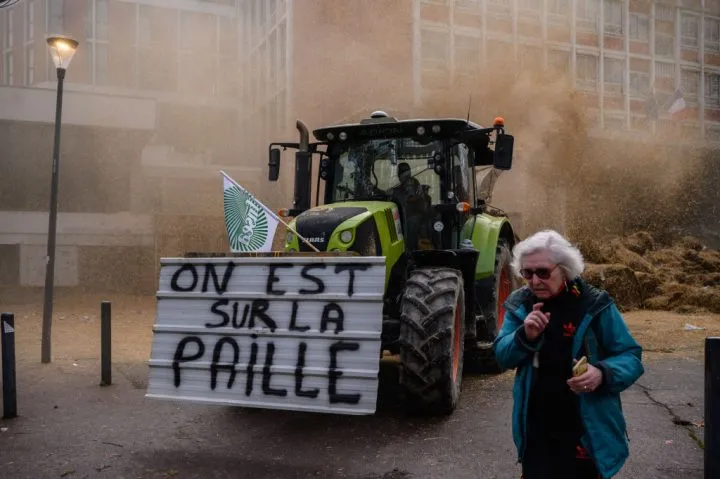France’s countryside has been in a state of uproar for the past two weeks. Growing discontent among French farmers has finally erupted: streets and highways have been blocked by tractors, cheap produce dumped across roads, city halls and government infrastructure have been showered with manure, and vegetable peels, tires, hay bales, and hoes have been brandished in the rallying cries for fairer working conditions. Farmers have described an exhausting workload, low pay, as well as the war in Ukraine as creating difficulties in making ends meet, feeding into the feeling of discontent across the agricultural sector. However, it is President Emmanuel Macron’s newly appointed Prime Minister Gabriel Attal, that has made the proverbial vase overflow. The 34-year-old has been the subject of intense scrutiny from the media alongside the population since his appointment on the 9th of January. His education, sexual orientation, and young age have all littered the public forum while his policies have taken a back seat. Nevertheless, it is Attal’s, his government and the European Union’s recent commitments to helping Ukraine that have aroused the ire of French farmers. Alleviating conditions on Ukrainian imports as well as requiring French farmers to leave 4% of their land fallow or unused have only increased the farmer’s impression of their government abandoning them in favour of the Ukrainian cause.
Compounded by what has been described as an overzealous administrative process that has long complicated their lives, France’s farmers have decided that “enough is enough” and in typical French fashion, have begun to demonstrate and protest to demand fairer conditions. The general “ras-le-bol” sentiment felt across the nation started by small grassroots demonstrations has blossomed into a nationwide movement. Unions have had significant input, especially the Fédération Nationale des Syndicats d’Exploitants Agricoles(FNSEA) and Jeunes Agriculteurs (JA).
These unions, their involvement and motives have been called into question by a significant part of French farmers; fearing that they are pursuing their own specific agenda and ignoring the farmer’s most crucial claims. Nevertheless, it is undeniable that they have helped the movement to grow and organize itself beyond the small grassroots start. Farmers describe feeling cheated: being forced to play an unfair game with rules tipped against them from the start. Disadvantaged against non-EU imports, they feel that they are fighting for the attention of French consumers.
France is the European Union’s biggest agricultural producer and yet, the farmers feel their situation is hopeless: making a living is practically impossible as a result of the overzealous national requirements compounded by the European Union’s policies such as the Common Agricultural Policy (CAP) currently worth $55 billion that mostly exists as direct payments to farmers in financial difficulty which makes any profit almost non-existent. Another EU measure requires farmers to carry out crop rotations or reduce fertiliser by at least 20%. What may have been an environmentalist’s dream, unfortunately, represents enormous efforts from farmers resulting in reduced yield. Farmers are asking for a stable and equal framework in which they wouldn’t be unfairly disadvantaged in comparison to the competitive international produce sold at a low cost. Farmers want to level the playing field and ease the Sisyphean task that has been set before them. The EU had momentarily lifted import restrictions on Ukrainian produce which then flooded the market: the average Ukrainian farm is about 1000 hectares compared to 41 hectares in Europe. Ukraine’s farming capacity far outweighs any of the European powers. As such, the French farmers are simply not playing the same game as the Ukrainian farmers and are at a disadvantage in terms of capacity of production, exports, infrastructure and much more.
In an attempt to increase the pressure on Attal’s government, the farmers had decided to converge towards the capital, block Paris and especially Rungis, Paris’ principal wholesale market which is said to be the largest food market in the world. On the 31st of January, 91 individuals had been arrested after a break-in at the warehouses of the Rungis market. The government, replying to the threat of a frozen Paris, sent police to control the demonstrations which has sparked adverse reactions from the protestors and an increase in support from the French population. There has been overwhelming support from the French public since the beginning of the movement, as the public is all too aware of the high suicide rates in the profession and gruelling work.
The government first replied to the farmers’ demands with a first set of measures announced on the 26th of January but were deemed “too late too little” by the majority of the protestors, with the demonstrations continuing and the march on Paris slowly gaining traction. Attal, perched on a bale of hay, thought he was putting an end to the anger by announcing “ten measures of immediate and urgent simplification” including abandoning the planned price increase of non-road diesel, a €50 million fund put into place to help struggling farms, the creation of another fund to help those affected by storm Ciaran that hit Bretagne in January, as well as a promise to streamline the administrative processes and help farmers make a living.
The anger had not subsided, Attal was forced to announce six days later, a second salve of immediate measures that have for the majority, placated the movement. Attal has criticized the “law of the jungle” and has promised to help defend French farmers against disloyal competition and an unfair and restrictive European system. The government has announced a fund of €150 million to help relieve stockbreeders. Attal’s announcement has seemingly reassured the farmers while worrying the more environmentally conscious, as well as thoseobservant to the agrarian’s sector deep fractures. Attal’s introduced policies seem to indicate a symbolic pause in the EU and French laws pursuing organic status and reduced pesticide use such as with the pausing of the Ecophyto plan; instead promising to help restore things to where they were; however one has to wonder is that really the solution? The obligation for farmers to leave part of their land unused has been overruled with an exemption valid for up to one year, and finally Attal, in a symbolic gesture, added his wish for the goal of food sovereignty to be enshrined in rural law. The French government has indeed reacted with the greatest urgency to this popular movement, and yet the rural and agricultural sectors are still in dire need of reform if we are to pursue sustainable production.
These measures have been welcomed by the movement, with the FNSEA announcing and calling all farmers to desist and cease all protests. However, it has not been unanimous; a few unions including Confédération Paysanne, have called to pursue the protest and have described these measures as “the bare minimum”. Despite having subsided in France, the movement has been picking up traction across the European Union, farmers bolstered by the victory of their French counterparts; 1,200 tractors converged towards Brussels last week and in Spain, the agrarian unions are demonstrating.
Overall, the French farmers have indeed succeeded in their demands. Yet this success only spells a temporary retreat of the farmers; questions remain concerning EU regulations and national sovereignty. Attal’s capabilities as well as the environmental concerns have taken a step back. This movement has united France but has also shone a light on the many fractures and problems in the rural sector that will spell disaster if left unchecked.
Edited by Sahar Rabbani






0 Comments